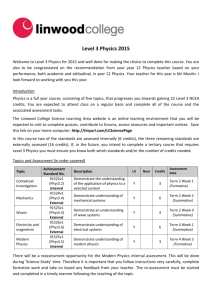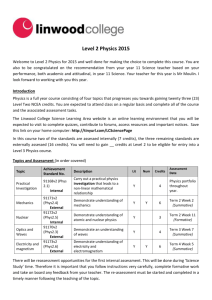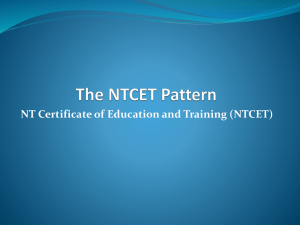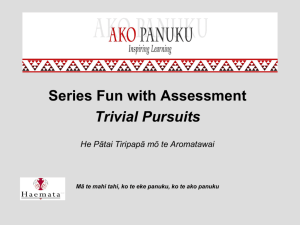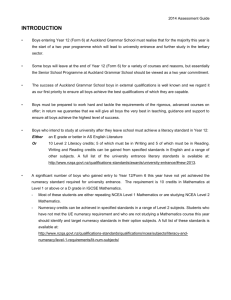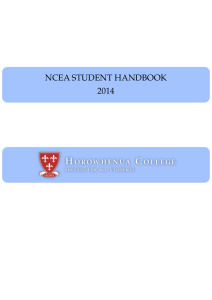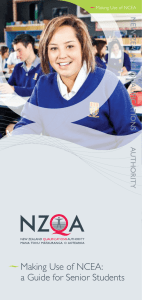ncea – thinking ahead: implications for the senior
advertisement
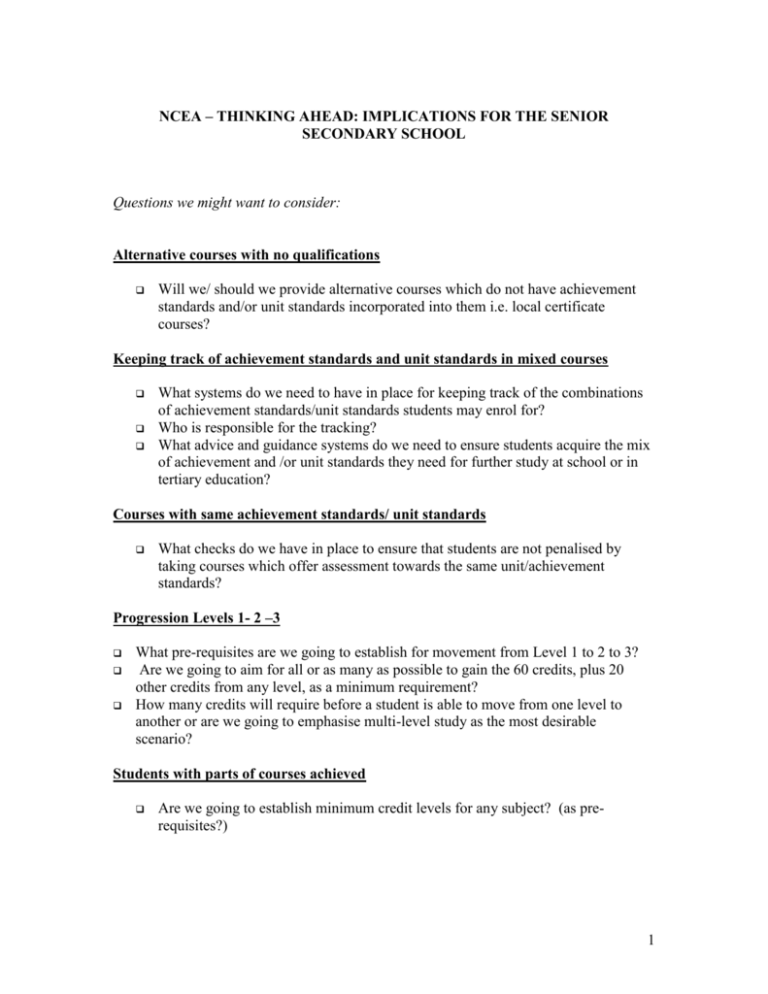
NCEA – THINKING AHEAD: IMPLICATIONS FOR THE SENIOR SECONDARY SCHOOL Questions we might want to consider: Alternative courses with no qualifications Will we/ should we provide alternative courses which do not have achievement standards and/or unit standards incorporated into them i.e. local certificate courses? Keeping track of achievement standards and unit standards in mixed courses What systems do we need to have in place for keeping track of the combinations of achievement standards/unit standards students may enrol for? Who is responsible for the tracking? What advice and guidance systems do we need to ensure students acquire the mix of achievement and /or unit standards they need for further study at school or in tertiary education? Courses with same achievement standards/ unit standards What checks do we have in place to ensure that students are not penalised by taking courses which offer assessment towards the same unit/achievement standards? Progression Levels 1- 2 –3 What pre-requisites are we going to establish for movement from Level 1 to 2 to 3? Are we going to aim for all or as many as possible to gain the 60 credits, plus 20 other credits from any level, as a minimum requirement? How many credits will require before a student is able to move from one level to another or are we going to emphasise multi-level study as the most desirable scenario? Students with parts of courses achieved Are we going to establish minimum credit levels for any subject? (as prerequisites?) 1 Literacy and numeracy requirements What can we do for students who do not gain the required 8 credits numeracy, 8 credits literacy? What are the implications for our school of the UE literacy and numeracy requirements? Correspondence School and other distance learning providers Will the Correspondence School be able/prepared to offer instruction in individual achievement standards e.g. to meet the needs of students particularly in smaller schools who wish to undertake study towards an achievement standard not offered by their school; Are there other distance providers which schools can use? Student load What is a full study load for a student? What are the implications for students of schools requiring them to undertake a 6subject course at Year 11 with a total possible credit load (144 credits) Should we be establishing requirements for subject departments to limit the number of credits attempted by students? What advice and guidance should be given to students around selection of achievement standards/unit standards to attempt? Entry Year 9 and 10 students into NCEA Is it desirable to have Years 9 and 10 students undertaking study towards achievement standards/unit standards – what are the benefits to the students? If we do allow students below Year 11 to undertake study towards achievement standards how do we ensure that we can meet the requirements of NAG 1 (ensuring students up to and including Year 10 receive a balanced programme in all of the 7 Essential Learning Areas). Development of new courses What fundamental principles should we consider when planning new courses Yr 11 on? What opportunities does NCEA offer for more flexibility in course design? 2 Planning programmes Timing of internal school “exams” – convert these to “assessment weeks” ? What central planning does the school need to do to ensure timing of assessments does not conflict with other school activities? Multi-level courses What changes to timetable structures might we have to make to give students the maximum opportunity to acquire the achievement standards/unit standards they require? Cut off date for internal achievement standards What is the desirable “cut-off” date for internally assessed achievement standards – reporting of assessment results? Consider: NZQA requirements, school processing requirements, proximity to external achievement standards assessment commencement. Flexibility How flexible can we afford to be with all/some of our students? Do we actively encourage combinations of short courses, off site courses that generate credits for all students or only some students e.g. work experience students. Combination Courses If we offer combination courses that cut across traditional subject lines (e.g. Year 11 Science which includes a mix of Physics, Biology and Chemistry standards or Year 12 Social Science which includes a mix of History and Geography standards), what are the implications for these students as: they move up the levels in the school; move into employment; move on to tertiary providers; want to ensure they meet UE requirements. Withdrawal of entries for internal standards What are the implications for students in terms of their result notices if they withdraw their entries when they know they have not achieved. Should we actively encourage/discourage them from doing this or be neutral ? In terms of tertiary providers / employers / entry to a higher school level, will a result notice that indicates they studied the full range of standards and only achieved success in some of them be of more value than one only showing success. 3 Certification Should we encourage students to apply to have their results registered at the end of each year or encourage them to accumulate credits and apply for certification at the point at which they leave schoo ? Overseas /exchange students How will the new qualification make a difference to their ability to gain qualifications? University Entrance To what extent will the proposed increased flexibility here impact on our senior school planning and student course choice? Scholarship How much impact does this have on our Year 13 courses and class organisation? 4
